The Edmonton Oilers’ lengthy and storied history in the NHL involves numerous major individual awards. The franchise has had a player win nearly every major award, including in the WHA, with the exclusion of the Selke, Calder, and Masterton Trophies. This spans over eras with the 1980s Stanley Cup teams garnering a multitude of achievements, along with the current rendition of the organization with Connor McDavid and Leon Draisaitl receiving multiple individual accolades.
WHA Award Winners
Mike Rogers 1974-75 (Gentlemanly Conduct)
Dave Dryden 1978-79 (Top Goaltender and MVP)
Wayne Gretzky 1978-79 (Rookie of the Year)
Despite winning just one series in their WHA history, the Edmonton Oilers had a rich history and developed a strong foundation in the WHA. Their first award was earned by former Hartford Whaler, Rogers, who had two 40-goal seasons in the NHL.
Related: Oilers History – The Importance of Jimmy Carson
At just 19 years of age, in his first professional season of 1974-75, Rogers led the Oilers in nearly every offensive statistical category with 35 goals and 83 points. Incredibly, he incurred just one minor penalty throughout the entire season, even with the struggles of the team. This stellar and near-perfectly clean play garnered him the Paul Duneau Trophy for gentlemanly conduct, similar to the Lady Byng.

The 1978-79 season was the Oilers’ most successful, prior to arriving in the NHL, as it involved a first-place finish and trip to the WHA finals, eventually losing to the Jets. This campaign could be primarily attributed to the exceptional play of Gretzky and Dryden.
Gretzky received rookie of the year honors for an astounding 43-goal, 104-point season at the tender age of 17. On a line with Blair MacDonald and Brett Callighen, Gretzky displayed the legendary play of the Great One and nearly captured the WHA Avco Cup, while earning the Lou Kaplan Rookie of the Year Trophy.
Dryden achieved some success in the NHL, prior to arriving in the WHA, with the Chicago Blackhawks and Buffalo Sabres, but nothing compared to his Bert Haskin Trophy (Best Goaltender) and Gordie Howe Trophy (MVP) winning season of 1978-79. Dryden carried a team with a lack of quality depth, outside of Gretzky’s top line, to its most successful season in franchise history up until that point.

Dryden held an exceptional record of 41-17-2 in 63 games, while in his absence the Oilers managed a record of just 7-13. That season Dryden led the league in games played, wins, goals-against average (GAA), and tied for the lead in shutouts. He was also quite stellar in Edmonton’s playoff run, playing in all 13 games. However, he was never able to capture that same quality playing ability in the NHL and managed just 14 more games following the merger.
Lady Byng Trophy
Gretzky 1979-80
Jari Kurri 1984-85
The Lady Byng Trophy is given to the individual who incorporates exemplary sportsmanship and conduct with a high level of playing ability. Gretzky and Kurri embodied these traits throughout their careers and were rewarded in 1979-80 and 1984-85, respectively.
This was Gretzky’s first season in the NHL, in which he proceeded to win the Hart Trophy (MVP) and tied for the league lead in points. Furthermore, he had just 21 penalty minutes and played with great class, as he continued to do for the rest of his career. He went on to capture four additional Byng Trophies with three on the Kings and one with the Rangers in his final NHL season.
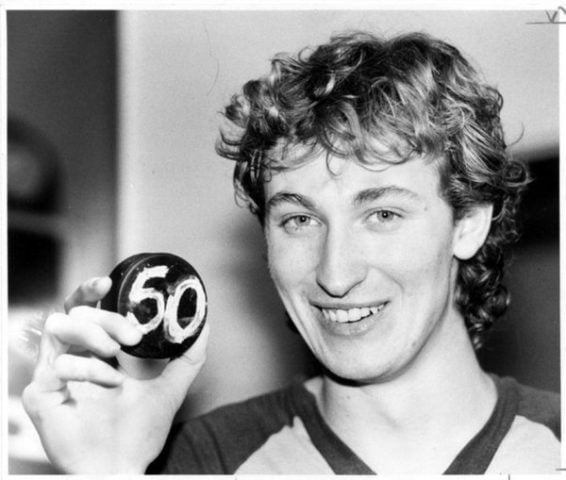
In Kurri’s Byng winning season, he provided the Stanley Cup-winning Oilers with a 71-goal campaign with just 30 penalty minutes and provided gentlemanly conduct and great effort consistent with the 1980s Oilers as an organization.
King Clancy Memorial Trophy/NHL Man of the Year
Kevin Lowe 1989-90
Ethan Moreau 2008-09
Andrew Ference 2013-14
Along with exceptional conduct on the ice, the Oilers have also had three players recognized for displaying their top-notch character off the ice, as well. The defunct NHL Man of the Year and current King Clancy Trophy acknowledges an individual who, along with on-ice leadership, also provides significant humanitarian contributions and exemplary quality off the ice.
Lowe is a Hall of Fame defenseman who has played the most games in Oilers history and was a former assistant and captain (following Mark Messier’s departure) of the organization. He received the award after the 1989-90 season for his charitable contributions, which included being a chairman on the Edmonton Christmas Bureau to provide food and gifts for those in need, being involved with the Shining Lights initiative through the RCMP to prevent child abuse, and holding an annual charity golf tournament.
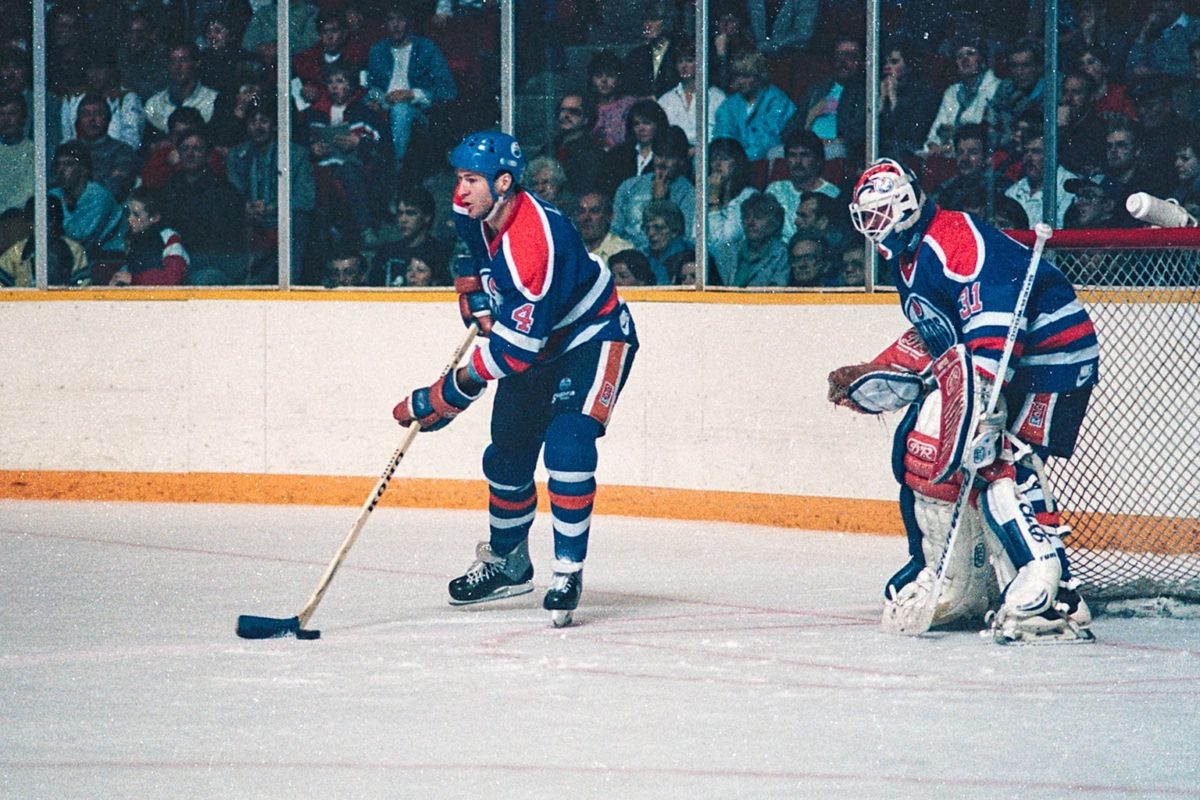
Former Oilers captain Moreau was the recipient of the award in 2008-09 due to major contributions to the Oilers Community Foundation. He was also involved in initiatives to aid inner-city high school students in receiving new facilities, Caps for Cancer, and For Puck Surprise which raised $300,000 for local charities. Moreover, Moreau was involved with foundations such as the Cystic Fibrosis Foundation, United Way, the Canadian Cancer Foundation, Youth Emergency Shelters, and the local Children’s Hospital.
The most recent Oiler recipient of the King Clancy Trophy, Ference, was Oilers captain for two years following the departure of Shawn Horcoff. He created a carbon-neutral initiative for the NHL and has been a major proponent in causes associated with environmentalism. Ference was also heavily involved with the Oilers Community Foundation and has also founded many of his own charitable foundations and programs, such as the November Project, the Hope Mission Shelter, and a Christmas toy drive and delivery program for the local Children’s Hospital.
Jack Adams Award
Glen Sather 1985-86
The Jack Adams Award, for coach of the year, has been won by an Oilers coach just once in its history, by Sather in 1985-86. Sather is the greatest and winningest coach in the history of the franchise, including six straight Smythe division titles and four Stanley Cups as head coach. He was recognized as the league’s best coach in a season that saw the Oilers achieve an outstanding record of 56-17-7 for 119 points and the league’s top record.

This was the ninth-most winningest season by a team in NHL history and 11th all-time in points in the standings. The season also saw Gretzky receive the Art Ross and MVP and saw the Oilers win the President’s Trophy and nearly beat their own record for most goals in a season.
Sather was a revolutionary coach who got the best out of the supremely talented roster the organization had assembled, so there is no surprise that he was recognized as the best coach in the NHL. Unfortunately, this was the season in which Steve Smith scored in his own net against the Calgary Flames, thus breaking up what could have been a potential five-peat.
Norris Trophy
Paul Coffey 1984-85, 1985-86
Coffey owns nearly every Oiler statistical record for defensemen and is undoubtedly the greatest at the position in franchise history. He was recognized twice as the best defenseman in the league and, in my opinion, it should have been three in a row, but he lost out to Rod Langway in 1983-84. Coffey had a stretch of seasons offensively unparalleled by virtually every defenseman in history, with the exception of Bobby Orr.
He was instrumental in the Oilers’ Stanley Cup runs, along with one Cup in Pittsburgh. Coffey was known for his blazing speed and his dazzling playmaking ability, which culminated in back-to-back Norris Trophy victories.
In the 1984-85 season, he scored 37 goals and 121 points, while posting a +55 rating. This campaign placed him fifth on the scoring list and he shattered the record for points by a defenseman in a single playoff run with 37, while breaking the defenseman goals and assists record with 12 and 25, respectively.
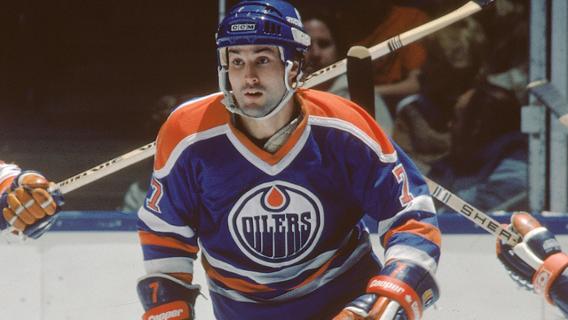
He followed this historic season with arguably the greatest single season by a defenseman in history (in my opinion second behind Orr in 1970-71), as he proceeded to break the single-season goal record for a defenseman with 48 and missed the points record by one, finishing with 138 points to Bobby Orr’s 139. This offensive output placed him third on the points scoring list, seventh in goals, third in assists, and fourth in MVP voting, along with an outstanding +61 rating.
Coffey won another Norris in 1995 on the Red Wings, but his tenure in Edmonton is still arguably the greatest stretch of seasons by a defenseman in NHL history, resulting in two seasons of being recognized as the league’s top defenseman.
Art Ross Trophy
Gretzky 1980-81 to 1986-87
McDavid 2016-17, 2017-18
Draisaitl 2019-20
Despite tying for the league lead in points in Wayne Gretzky’s first NHL season of 1979-80, he lost out on the Art Ross Trophy to Marcel Dionne due to the tiebreaker of most goals. He then proceeded to own the trophy, winning it the next seven years running. The point totals in those seasons astoundingly read as 164, 212, 196, 205, 208, 215, and 183. There was no parallel to Gretzky and in most years no player even came close to winning the award from him. He also went on to win three more Art Ross trophies as a member of the LA Kings.
In recent years, the Art Ross has again begun making itself at home in Edmonton with McDavid and Draisaitl winning three of the last four. McDavid captured the award with little support in his second and third seasons in the NHL with 100 and 108 points, before finishing second behind Nikita Kucherov in 2018-19.
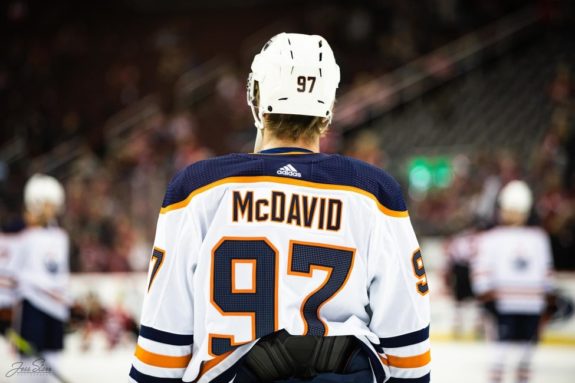
Draisaitl captured the award this past 2019-20 season with 110 points in a race with his teammate McDavid prior to his injury. It seems as though the trophy could potentially be remaining in Edmonton for the foreseeable future with two elite centers scoring points in bunches, unlike many others in this era.
Vezina Trophy
Grant Fuhr 1987-88
Fuhr is the winningest and widely regarded as the greatest goaltender in Edmonton Oilers history. He is one of two Oilers goaltenders to win a major individual NHL award, along with Bill Ranford’s Conn Smythe Trophy in 1990. Fuhr backstopped the Oilers throughout their championship runs of the 1980s, and although his stats often don’t measure up to other Hall of Fame goaltenders, he was absolutely instrumental in keeping the offensive-centric Oilers in games and ensuring victories.
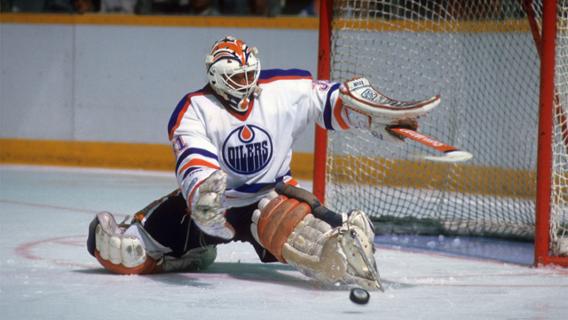
He was awarded the best goaltender in 1987-88, a season in which he led the NHL in wins with 40, games played with a whopping 75, tied for the league lead in shutouts with four, and assists, as he managed eight. Fuhr also finished 19th in save percentage and 15th in GAA, which is quite good, when considering the style of play the Oilers often engaged in. Along with the Vezina, Fuhr also nearly joined the vaunted group of goaltenders to win the Hart, finishing second behind Mario Lemieux, and won the Stanley Cup.
Ted Lindsay Award and Hart Trophy
Gretzky 1979-80, 1980-81 (Hart Trophy), 1981-82 to 1986-87 (Both Awards)
Messier 1989-90 (Both Awards)
McDavid 2016-17 (Both Awards), 2017-18 (Lindsay Award)
Draisaitl 2019-20 (Both Awards)
The Ted Lindsay Award, formerly the Lester B. Pearson Award, and the Hart Trophy are the most esteemed regular season awards in the NHL, as they signify the most valuable player in the league, as voted by the players and media, respectively. These awards are bundled together here due to the overlap of the two awards, as there are only three seasons where an Oiler won one of these trophies, but not the other.

Gretzky’s exploits have been well-documented and as the greatest player in the history of the NHL it is expected that he would have the most MVPs. In the 1980s, the Hart Trophy was won in Edmonton eight times among Gretzky and Messier. In Edmonton, Gretzky garnered seven Harts (1979-80 to 1986-87) and five Lindsay/Pearson Awards as the undoubted best player in the game, although he lost out on the Lindsay in 1979-80 and 1980-81 to Dionne and Mike Liut, respectively. Gretzky also garnered a Hart Trophy victory with the Kings.
Upon Gretzky’s departure from Edmonton, the limelight rested solely on the captain Mark Messier, who delivered significantly. In 1989-90, Messier was a dominant force in Edmonton with a 129-point season as the clear top scoring option on the team. This placed him second in the league in points, behind Gretzky, as the Oilers finished second in the Campbell Conference.

In the playoffs that season, Messier, with Craig Simpson and Ranford, carried the Oilers to a championship in the absence of the Great One, lifting him out of Gretzky’s shadow and cementing Messier’s status as one of the absolute all-time greats.
In recent years, McDavid and Draisaitl have both received an MVP, with McDavid gaining both the Hart and Lindsay in 2016-17 and just the Lindsay in 2017-18, losing out on the Hart to former Oiler Taylor Hall that season. Draisaitl won both awards following the 2019-20 season, as he won the Art Ross and continued to carry the Oilers to the playoffs, even in the absence of McDavid.

In both of McDavid’s award-winning seasons he won the Art Ross, and prior to Draisaitl’s arrival as an elite player, McDavid nearly single-handedly won games for the Oilers and pushed them into the playoffs and second round in 2016-17. There are undoubtedly more MVP awards to come for this dynamic duo of Oilers, as they are clearly two of the most valuable players to a franchise of this era and the state of the team is virtually unimaginable without these players.
Conn Smythe Trophy
Messier 1983-84
Gretzky 1984-85, 1987-88
Ranford 1989-90
The Oilers have won five Stanley Cups, yet have only won four Conn Smythe trophies due to Ron Hextall winning the award in 1987 for leading the Philadelphia Flyers to Game 7 of the Final against them. The Conn Smythe trophy for playoff MVP was first won by an Edmonton Oiler during their first Stanley Cup victory in 1984 by Messier.
Despite Gretzky’s league-leading 35 points in those playoffs, Messier earned the Conn Smythe with eight goals and 26 points, along with stellar defensive play and much-needed physicality. Messier led the team in blocked shots and faceoffs while finishing third on the Oilers in points, as they defeated the Winnipeg Jets, Flames, and Minnesota North Stars en route to a Finals rematch against the New York Islanders, thus ending the Islanders dynasty.
The next season, the Oilers again won the Stanley Cup by defeating the Flyers in five games. This time there was absolutely no debate regarding the Conn Smythe, as Gretzky shattered his own record for most points in a single playoff with 47 to go along with 17 goals (two off the record) and 30 assists (a record at the time).
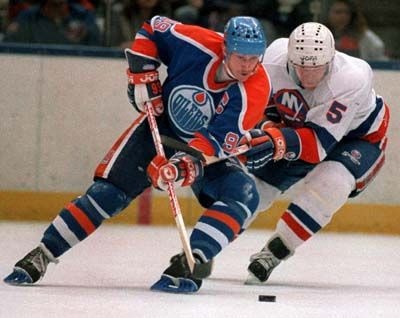
Following Hextall’s victory, despite a loss to the Oilers in 1987, Gretzky garnered the award again in 1988. Those playoffs, Gretzky broke his own playoffs assists record with 31 and finished with 43 points to lead all players, as the Oilers defeated first-place Calgary and the Detroit Red Wings before sweeping the Bruins in the Stanley Cup Final. This Final was Gretzky’s last series with Edmonton, which turned out to be his greatest due to his record 13 points in the series.
The most recent Conn Smythe winner for the Oilers was Ranford in 1990, which remains their only Stanley Cup without Gretzky. Ranford was a surprise starter in an even more surprising Cup run, as Andy Moog had moved to their Finals opponent in Boston and Fuhr had sustained an injury placing him out of the playoffs entirely.
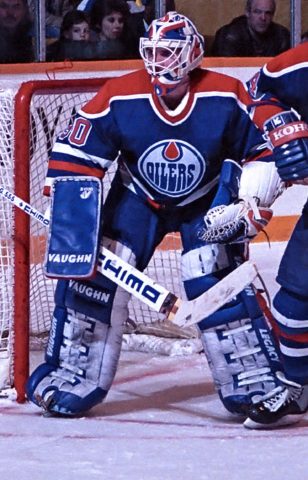
Ranford had a decent regular season in replacement of Fuhr in 56 games, however, his playoff success was spectacular. Ranford went 16-6 with a 2.53 GAA as he willed the Oilers over rival Winnipeg, Gretzky’s LA Kings, Chicago, and finally Boston in five games. At 23 years of age, Ranford performed the greatest stretch of goaltending in franchise history and led the Oilers to their fifth championship in history.
Future Oilers Award Winners and Final Thoughts
The Calder (rookie of the year) and Selke (best defensive forward) are two awards that continue to evade the Oilers. They have gotten quite unlucky with the Calder Trophy in years past, however, as Gretzky was ineligible due to his prior season in the WHA and McDavid sustained an injury during his rookie season. However, there are some young prospects that may have the ability to receive these awards in the years to come.
Related: Worst Trades in Oilers Franchise History
In terms of other awards, with two of the top superstars in the NHL on the roster in McDavid and Draisaitl, there should be no shortage of expectations for many awards in the years to come. These two are clearly two of the most valuable players to their organization, although the lack of playoff success and front office mismanagement may begin to hinder their outlook.